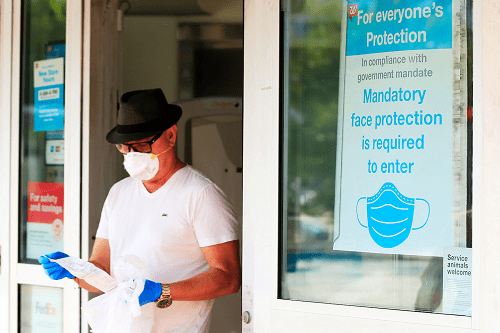
Collectively, the records depict the desperation of the employees as well as their frustrations with employers who in their view were at best simply unprepared for a pandemic and at worst callously unconcerned with worker safety.
The records show worker concerns about shortages of masks and gloves, of being forced to work with people who appear sick, and of operating in cramped work areas that prevent them from standing six feet from one another.
“The call center with over 400 people is unsanitary,” one complaint reads. “Employees have to share desks and people are within 2 feet from each other.”
“In the behavioral unit, employees are not allowed to wear surgical masks because ‘it hurts patient’s feelings,’ despite the fact that patients come in with fevers,” says another from a California hospital.
“The employer has not instituted protective measures to protect employees conducting facials and full body waxing from infectious diseases such as but not limited to COVID-19,” according to a complaint from a Florida beauty parlor.
The largest share complaints come from health-care workers: Some have been given “plastic ponchos” and masks made out of paper towels, they say; others report a lack of hand sanitizer or soap; pharmacists and technicians have been forced to work in proximity without protective gear. But the complaints span a broad variety of workplaces, including Yosemite National Park, factories and funeral homes.
Democrats and workers’ groups have pressed the Trump administration to enact rules requiring employers to follow the Centers for Disease Control and Prevention’s safety guidelines for employers. The Labor Department has declined to do so, instead giving advice to employers that is not legally binding.
The toll on workers has been startling.
More than 500 workers at the Smithfield Foods plant in Sioux Falls, S.D., have reportedly come down with the virus. Already there have been deaths of workers at a Trader Joe’s in Scarsdale, N.Y., a Giant in Largo, Md., and a Walmart in the Chicago area. At least 40 registered nurses have died in the United States, according to National Nurses United.
Despite requests from unions and members of Congress, OSHA has yet to issue a specific coronavirus standard for employers that would protect many “essential” workers, leaving employers to come up with their own ways of trying to meet health guidelines.
The result has been a patchwork of precautions. Some stores let customers in without masks, others do not; some places offer employees masks, other have forbidden employees to wear them, either because that might scare customers or because they are in short supply.
It further recommends that when the virus is present in an area, employers should “consider offering face masks to ill employees and customers” and that health-care workers dealing with sick patients “should wear respirators.”
But the booklet notes that these precautions are not legal requirements.
“This guidance is not a standard or regulation, and it creates no new legal obligations,” the booklet begins. Instead, it points to general requirements for personal protective equipment and an employer’s “general duty” to maintain safe workplaces.
Health-care workers in particular have complained about the unsafe conditions, the records show. The complaints often revolve around a lack of masks and “negative pressure rooms” in which to isolate coronavirus patients.
Nurses do not have access “to proper protection equipment such as N95 masks and surgical masks,” according to one typical complaint from a Los Angeles hospital. “The employer is locking them away. Nurses have been denied the masks when handling patients.”
Another OSHA complaint came from hospital in Windham, Conn., where a health-care worker was asked to work on a floor with covid-19 patients. Before entering a patient’s room, the worker picked up an N95 mask from the hospital supply, but was then told to put it back and use only a basic surgical mask, according to a complaint filed with OSHA.
“The employer has denied employees adequate Personal Protective Equipment (PPE) resulting in at least one employee (maybe more) contracting the COVID-19 virus,” according to the complaint.
Similarly, a surgeon at a New England hospital was told by management that he was breaking hospital policy by insisting that a patient with covid-19 wear a surgical face mask while coughing, since hospital policy dictated these masks only be given to positive patients while they are being transported, according to a physician at the hospital who had direct knowledge of the interaction and spoke on the condition of anonymity because of fear of retaliation from his employer.
The growing fears among workers has led to anger regarding what they say is the absence of forceful federal enforcement of rules requiring to keep workplaces safe.
A worker at a poultry plant in Camilla, Ga., filed a complaint to OSHA weeks ago, raising concerns about plant workers standing shoulder-to-shoulder on the assembly line, according to Edgar Fields, president of the Southeast Council of the Retail, Wholesale and Department Store Union, which represents poultry workers. Three employees at the plant have died of coronavirus, Fields said, but the workers’ groups have not heard from federal safety inspectors.
“People don’t even waste their time calling OSHA anymore. We’ve called OSHA and they’re useless,” Fields said, adding the agency’s responsiveness has dramatically declined. “Why waste your time?”
